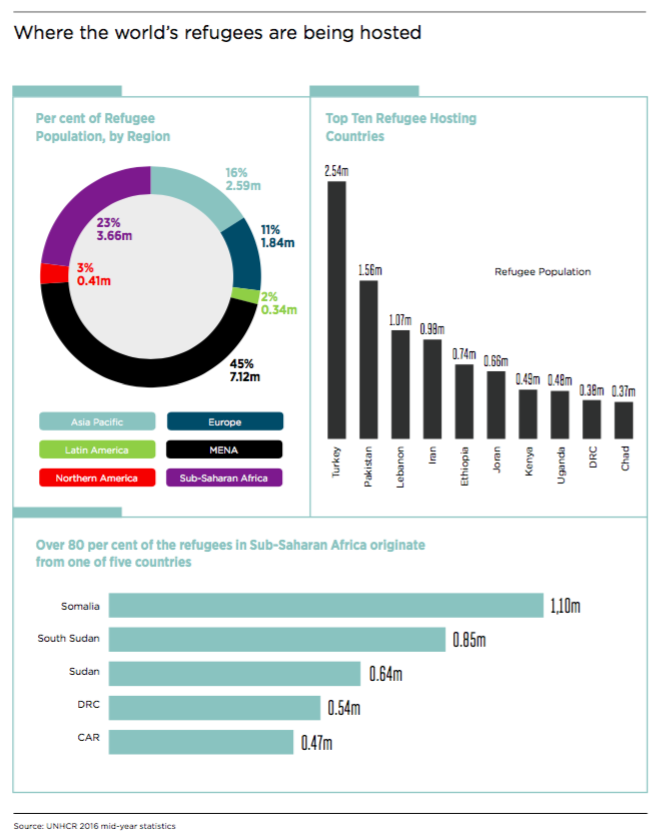Today, on the 20th of June, the international community is celebrating World Refugee Day by drawing attention to the unprecedented and ever-increasing number of people who have been forced to traverse international borders to escape physical, economic and social hardships such as new and unresolved conflict, human rights violations or persecution.
It is estimated that the global refugee population now stands at 21 million people, over half of whom are under the age of eighteen. While much attention has focused on the refugees arriving in Europe and North America, the overwhelming majority of refugees – nearly nine in ten – are being hosted by developing countries. Sub-Saharan Africa is home to nearly one quarter of the world’s refugee population, and across the Middle East and North Africa, large refugee flows have been fuelled by ongoing conflicts in Syria, Yemen and parts of Iraq.

Over the past year, the GSMA has been researching how digital technology, especially mobile, can be leveraged to support refugee populations and the organisations that are working to serve them. A number of successful initiatives are documented on our Refugee and Connectivity Portal; from the Instant Network Schools in Tanzania, which enable young refugees and teachers to access digital educational content and the internet, to REFUNITE – an online database that harnesses the power and scale of mobile to help facilitate family reunification.
Over the last few years a number of important papers have been published by GSMA and other organisations on the subject of refugees and connectivity, and many of these are now found in our portal’s Resource Library. Last month, the GSMA’s Disaster Response and Mobile Money programmes added another important piece of research to this collection with the publication of their report on Mobile Money, Humanitarian Cash Transfers and Displaced Populations. This paper investigates the use of mobile money-enabled humanitarian cash transfers to support displaced populations, examining case studies in Haiti, Rwanda and Pakistan.
On the back of this research, we’ve recognised that an area deserving increased focus is the opportunity for mobile and digital technology to play a role in establishing unique, digital identities for refugees. In our newest report, Refugees and Identity: Considerations for Mobile-enabled Registration and Aid Delivery, the Digital Identity team provides a deep-dive into the refugee registration and identification processes, and explores the identity-related challenges refugees face when attempting to access mobile services.
It is clear that there are emerging opportunities for mobile network operators (MNOs) and mobile technology to play a vital role in improving the means and efficiency by which refugees are registered and assert their identity. The report points to a handful of exciting initiatives the Digital Identity programme will be following over the coming months, including the mobile data collection tool KoBo Toolbox, UNHCR’s VERIFY-MY app from Malaysia, and the mobile-enabled blockchain platform BanQu.
Innovations in mobile technology have also brought about a shift in the way humanitarian organisations deliver aid to refugees. However, it is critical to recognise that in most refugee-hosting countries, MNOs are now subject to mandatory SIM registration obligations which require customers to present an approved identity document before a SIM card or mobile money service can be activated. Displaced populations may, especially at the outset of their displacement, lack the identity documents required to pass Know Your Customer (KYC) criteria; this means that in markets where humanitarian-issued IDs are not accepted for KYC purposes, and asylum seekers and refugees face challenges or delays obtaining a government-issued ID, opportunities for MNOs to offer both basic and value-adding mobile services can be restricted.
We show that in Kenya, strict KYC requirements and lengthy status determination procedures mean that many refugees must wait at least three years before they acquire the documents they need to register for mobile services. The Bamba Chakula Initiative, an impressive collaboration between UNHCR, the World Food Programme and Safaricom, has been designed around this reality, with refugees receiving electronic food vouchers on special, single-purpose mobile SIM cards that cannot be used to make or receive calls, send texts, browse the internet or access mobile money services. In sharp contrast to this, enabling KYC policies in Iraq have allowed humanitarian agencies to leverage mobile money services such as ZainCash to deliver vital cash aid to thousands of refugees. ZainCash is a mobile money service linked to a fully-functional, registered SIM card, which allows refugees to receive payments, transfer money (within Iraq), pay bills, and purchase goods and services.
The initiatives in Kenya and Iraq highlight how MNOs, humanitarian organisations and governments can work collaboratively to navigate identity-related KYC barriers and ensure that refugees have access to a range of mobile services. The flexible, risk-based approach to KYC in markets such as Iraq (and many other markets, including Haiti) also demonstrates how government and national regulators can help ease the barriers to mobile access among refugees, resulting in new commercial opportunities for MNOs and an ideal context for humanitarian organisations to communicate with beneficiaries, transfer assistance, collect data, and establish unique digital identities.

